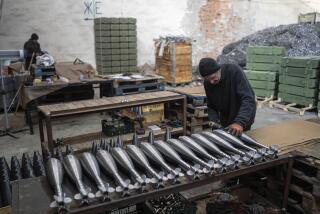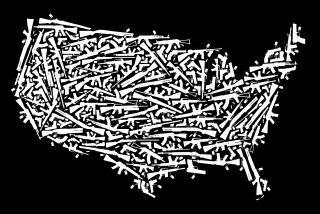Russian Troops Are Selling Guns to Chechen Rebels : Warfare: Greed, not ideology, is apparently behind practice. It could well prolong the conflict in the breakaway region.
- Share via
ACHKOI-MARTAN, Russia — If Russian forces have suffered heavy casualties in their three-month war with secessionist Chechnya, they can start by thanking themselves. Across the breakaway republic, Russian troops are selling weapons to the very rebels they have been sent to defeat.
“It’s nonsense. They sell us weapons that are used to kill them,” said Lom-Ali Shamayev, a 34-year-old Chechen businessman with a New York address who bankrolls his own band of 116 guerrillas.
Shamayev is one of the Russians’ best customers, but there are reportedly many others. Russian officers and soldiers run guns to everyone from a vodka salesman in Tolstoi-Yurt to Aslan Maskhadov, commander of the Chechen armed forces.
The practice--apparently prompted by greed rather than sympathy for the Chechen cause--could well prolong a war that the Russian government conservatively estimates has cost the lives of at least 1,300 soldiers.
Shamin, a 28-year-old engineer who sells liquor from a roadside card table outside Tolstoi-Yurt, said he understands why Russian soldiers so casually sell their weapons: They just don’t care anymore.
“Everything’s lost its value to them. They’re cynical,” the young engineer said. “They give things away. One soldier walked up, tossed a pistol on my table, took a bottle of vodka and walked away.”
Soldiers manning checkpoints sell the weapons they have confiscated or captured from rebel fighters, because no one within the Russian military hierarchy monitors the fate of “trophy weapons.”
Ammunition and grenades are also readily available.
“No one keeps track of how many bullets you fire or grenades you throw,” said Lt. Igor Polutin, a 26-year-old prisoner of war held by Chechen fighters outside the town of Argun. Polutin confirmed that officers and soldiers sell weapons, although he added that ordinary soldiers are held strictly accountable for their rifles.
When they’re too lazy or remote to sell ammunition, the Russians often simply throw it away. In a muddy field in Tolstoi-Yurt where Russian artillery units had been based, children were playing recently with bullets and rockets strewn among the trash. The Russian units had pulled out five days earlier, and dozens of enterprising Chechens had already loaded up what they could carry, but crates of bullets remained.
“(Soldiers) will do anything for vodka,” said Bezlan, a 14-year-old boy who buys gas from Russian soldiers to resell it to Chechen civilians and guerrillas. “They sell everything--lemons (slang for grenades), guns, bullets--but we don’t buy anything except rockets. We shoot them off at night.”
Until he was approached by the Russians, Shamayev bought his weapons at an open-air market in Urus-Martan, a nearby town whose residents oppose Chechnya’s secession from Russia and have cordial, though strained, relations with Russian soldiers. Everything from antitank grenades to decades-old six-shooters is on display at the market, on blankets draped over car hoods. Business is brisk.
But Shamayev said he stopped visiting the Urus-Martan market after the Russians made overtures outside the village of Assinovskaya, where Russian and Chechen lines were less than a mile apart. Shamayev responded, and a meeting was set up in a nearby forest. The Russians arrived in an armored personnel carrier.
Shamayev said he dealt only with two young soldiers, who told him their commanding officer was in the vehicle. Shamayev paid in dollars, and that first successful deal has since been repeated, he said.
“I don’t need to peer into their souls--I need a quick weapons buy, to arm my friends,” Shamayev said. “But they feel a sort of complex, and themselves start making excuses before me. They say: ‘Don’t shoot ordinary soldiers. Shoot the officers. We’re just following orders.’ They say: ‘When we’re told to shoot at the enemy, we shoot into the air instead.’ Or they say: ‘Shoot at the special forces soldiers (instead of us). They’re dogs; they do all the looting.’
“I don’t ask them about this--they themselves start talking. But I pat them on the shoulder anyway and say, ‘Hey, fellows, war is war.’ ”
Even the FSK, a successor agency to the KGB, has confirmed the all-too-obvious fact that Russian soldiers have been arming the enemy. But the FSK also says arms from abroad swell the arsenals of fighters for Chechen President Dzhokar M. Dudayev.
Chechen fighters say otherwise. Noting that all of their weapons are Russian--or Soviet-made--they say that they have been outfitted almost entirely by the Russians.
“The TV says we buy (weapons) from Azerbaijan, from abroad. But that’s nonsense. We buy from the Russians,” said Maskhadov, the top Chechen general. “We buy from officers and from soldiers.”
When Dudayev declared Chechnya independent in September, 1991, Russia ignored him. But when Gen. Pavel S. Grachev took over as Russia’s defense minister in May, 1992, Russian troops quartered in Chechnya were ordered to withdraw.
According to the Russian newspaper Izvestia, Grachev also ordered them to split their considerable local weapons stores with Dudayev. Why he would do so remains one of the great mysteries of the war.
Army officials say Chechen fighters stole from the Russian garrisons and then attacked them. Later, they say, the Chechens demanded the weapons stores as a ransom; in return, they guaranteed safe passage out of Chechnya for troops and their families.
Izvestia, however, suggested that high-ranking officers sold the weapons to the Chechens and that “the Chechens’ noisy attacks on the Russian army garrisons were no more than a show to divert attention from enterprising Russian army commanders.”
Reports of corruption in the Soviet army were rife in East Germany and in the Baltics, so a secret arms yard sale in Chechnya would be nothing shocking. Many Russians believe the Chechen-Russian war was engineered by officers and politicians to provide a cover for army corruption. Under this theory, Russian army weapons secretly sold to governments, mercenaries or terrorists could be written off as having been used or lost in the Chechen war.
Whether or not such theories are correct, they are widely subscribed to. And soldiers and officers find a justification in them for their own small-change weapons deals.
“The soldiers don’t want to be here,” Shamayev said. “They think only of how to stay alive and how to make money. They see how the generals make enormous amounts of dirty money, and they think, ‘What, am I less deserving?’ ”
More to Read
Sign up for Essential California
The most important California stories and recommendations in your inbox every morning.
You may occasionally receive promotional content from the Los Angeles Times.













